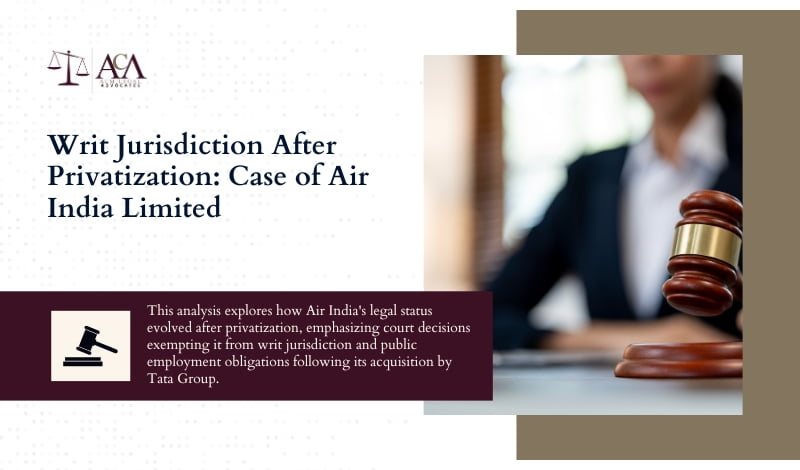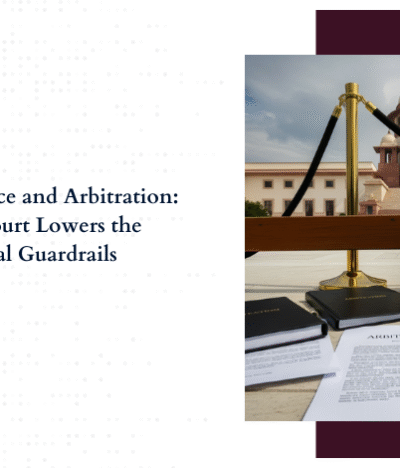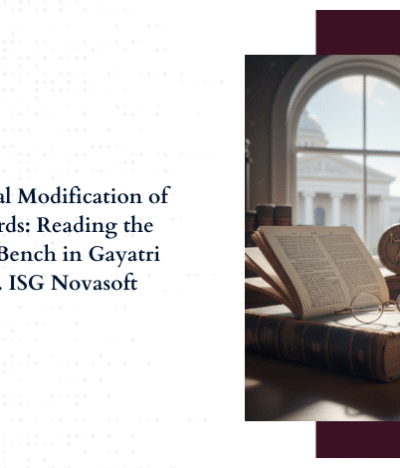Article 12 of the Indian Constitution, defines the term “State” which includes the Government and Parliament of India, the Government and Legislatures of each State, and all local or other authorities within the territory of India or under the control of the Government of India, thus encompassing all entities involved in public administration and governance. Article 12 does not directly confer powers but defines the term “State” for the purpose of Part III (Fundamental Rights). Entities considered as the “State” under Article 12 are subject to the obligations imposed by fundamental rights. This ensures that these entities respect and uphold citizens’ fundamental rights, thus limiting their powers to prevent the infringement of these rights.
In the recent discussions by the Delhi High Court and Supreme Court, the status of Air India was discussed post its merger if it still withholds the status of state its employees will fall under the purview of public employment. This blog discusses the status of entities after privatization and how far it goes with a special focus on the case of Air India Private Limited.
The Journey of Air India Limited
J.R.D. Tata founded the first airline, Air India, in 1932, initially named Tata Airlines. The airline’s services connected Karachi, Ahmadabad, Madras, Bombay, and Bellary. In 1946, it became a publicly traded company and was renamed Air India. The Indian government acquired a 40% stake in 1948. In 1953, the government enacted the Air Corporation Act to nationalize all airlines, including Air India. However, this act was repealed in 1993 based on recommendations from a committee chaired by Pramod Mahajan. The Indian Airlines enjoyed a monopoly in the market till the Indian economy was liberalized in 1991 after the entry of private airlines it faced immense competition from the low-cost airlines.
Why in the news recently?
India’s national carrier, Air India, had been incurring significant losses for years, accumulating a total deficit of $9.5 billion. After multiple attempts to sell the airline, the Government of India ultimately sold it to the Tata Group, which emerged as the highest bidder with an offer of nearly $2.2 billion. Hence, after the acquisition of the airlines by Tata Group the main question was if Air India still remains a ‘State’ in the eyes of the law and if its employees fall under the purview of public employment.
Judicial Check on the ‘State’ Status
The appeal was filed by Air India employees against the judgment passed by the Bombay High Court wherein four writ petitions were dismissed instituted by the former employees of Air India. The petition before the bench of the High Court claimed a violation of Article 14 (equality before law), 16 (equal opportunities in matters of public employment) and Article 21 (protection of life and personal liberty) of the Indian Constitution. The division bench of the Supreme Court upheld the judgment stating Air India ceased to be a state under Article 12 of the Indian Constitution after its disinvestment and takeover by the Tata Group in January 2022.
The Court noted that Air India was initially a statutory body formed under the Air Corporations Act, 1953. When this act was repealed by the Air Corporations (Transfer of Undertakings) Act, 1994, Air India merged with Indian Airlines and became a wholly government-owned company, thus falling under the ‘other authorities’ category in Article 12 of the Indian Constitution. This status persisted when the writ petitions under Article 226 were filed in the High Court against Air India. In 2021, however, the Government of India accepted a bid from Talace India Pvt Ltd. to purchase 100% of Air India’s shares. Following the share purchase agreement, Talace India Pvt Ltd. acquired all the government’s shares in 2022, resulting in Air India’s privatization and disinvestment. Therefore, as per the court, the writs were maintainable when they were filed but the question of maintenance arose when they were finally heard.
The Court relied on the judgments of Kalpana Yogesh Dhagat v. Reliance Industries Ltd. (2016 SCC OnLine Guj 101186); Asulal Loya v. Union of India (2008 SCC OnLine Del 838) and Tarun Kumar Bannerjee v. BALCO (2008 SCC OnLine Bom 1899) observed that disinvestment of the Government Company and its devolution into a private company. The Court stated that the disinvestment of a government company, resulting in its transformation into a private company, shields it from writ jurisdiction under Article 226 of the Indian Constitution, even if the litigation began when the company was still government-owned. The Court relied on the judgments in Kalpana Yogesh Dhagat, Asulal Loya, and Tarun Kumar Banerjee as correctly interpreting this legal issue. It confirmed that with the Government of India transferring its entire shareholding to Talace India Pvt Ltd., it no longer had administrative or pervasive control over the private entity. Consequently, post-disinvestment, Air India could no longer be considered a ‘State’ or its instrumentality under Article 12 and was thus exempt from writ jurisdiction under Article 226. The Court cannot exercise its extraordinary writ jurisdiction to issue a writ which has acquired the nature of the private entity
Conclusion
It is well-established that writ jurisdiction, aimed at ensuring the performance of public or statutory duties, is typically available only against the State as defined by Article 12 of the Indian Constitution. However, judicial pronouncements have extended writ jurisdiction to private individuals, primarily when they are performing statutory or quasi-statutory duties or roles. The courts across the country have admitted that private bodies that seek to achieve a collective benefit, entities that serve the public or a segment of the public and are recognized by them as authoritative perform public functions when they engage in social or economic activities impacting the public interest. Consequently, they are considered part of the ‘State’ as defined under Article 12 of the Constitution. The progressive pronouncements by courts have led various sectors to keep a check and analyze their roles.
However, the performance of public duty and serving the public at large becomes a very significant feature to be subjected to writ jurisdiction in India. Air India Limited after its disinvestment and privatization fails to be subjected to writ jurisdiction.
Source






